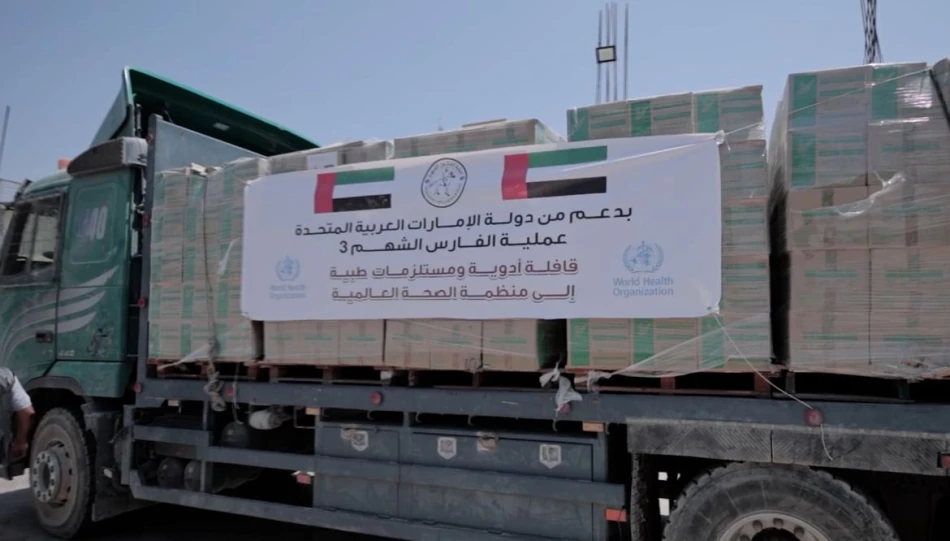
UAE Boosts Gaza's Healthcare with 65 Tons of Medical Supplies in Partnership with WHO
UAE Delivers 65 Tons of Life-Saving Medical Supplies to Gaza as Healthcare Crisis Deepens
The United Arab Emirates has delivered another substantial medical aid shipment to Gaza through the World Health Organization, providing 65 tons of critical medicines and emergency medical supplies as the territory's healthcare system faces unprecedented collapse. The delivery underscores the UAE's growing role as a regional humanitarian leader while highlighting the acute medical crisis gripping Gaza's 2.3 million residents.
Massive Medical Aid Package Addresses Critical Shortages
The latest shipment, transported via 11 trucks, includes life-saving medications and emergency medical equipment specifically designed to meet urgent needs of Gaza's remaining operational healthcare facilities. WHO representatives confirmed the supplies will be distributed directly to hospitals and medical centers struggling to maintain basic services under severe constraints.
The timing of this delivery is particularly significant as Gaza's healthcare infrastructure has deteriorated to critical levels. Medical facilities are operating at minimal capacity, with many hospitals forced to reduce services or close entirely due to supply shortages and operational challenges.
UAE's Strategic Humanitarian Diplomacy
This medical aid delivery represents part of the UAE's broader "Gallant Knight 3" operation, a comprehensive humanitarian initiative covering food security, shelter, education, and healthcare for Palestinian civilians. The operation demonstrates how the UAE has positioned itself as a key mediator and humanitarian actor in regional crises.
Building on Established Aid Networks
The UAE's collaboration with the WHO reflects a sophisticated approach to international aid delivery, leveraging established UN logistics networks to ensure supplies reach their intended destinations. This partnership model has proven effective in other conflict zones and represents a template for how Gulf states can project soft power through humanitarian assistance.
Regional Implications and Diplomatic Positioning
The UAE's sustained humanitarian engagement in Gaza serves multiple strategic objectives beyond immediate relief. It reinforces the country's commitment to Palestinian welfare while maintaining its diplomatic relationships across the region. This approach allows the UAE to demonstrate leadership on humanitarian issues without compromising its broader foreign policy objectives.
Comparison with Regional Approaches
Unlike some regional actors who focus primarily on political statements, the UAE has emphasized practical humanitarian assistance. This mirrors successful diplomatic strategies employed by countries like Qatar and Jordan, who have built international credibility through consistent humanitarian contributions during regional crises.
Healthcare Crisis Demands Sustained International Response
WHO officials emphasized that while the UAE's contributions are substantial, the scale of Gaza's healthcare crisis requires expanded international support. The organization has called for increased global coordination to address what it describes as one of the most severe medical emergencies in the region.
The current situation in Gaza represents a test case for international humanitarian response mechanisms. The UAE's consistent aid deliveries demonstrate how middle powers can fill critical gaps in global humanitarian assistance, particularly when traditional donor countries face domestic political constraints on aid provision.
Long-term Implications for Regional Stability
The UAE's humanitarian approach may influence how other Gulf states engage with Palestinian issues, potentially shifting focus from political rhetoric toward practical assistance. This pragmatic strategy could contribute to regional stability by addressing immediate human needs while avoiding inflammatory political positioning.
Most Viewed News

 Sara Khaled
Sara Khaled






